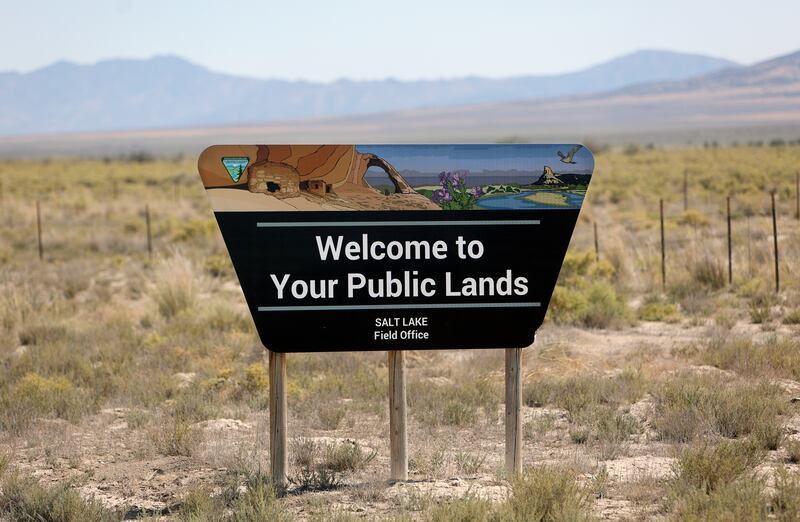A state judge has dismissed a lawsuit filed by the Southern Utah Wilderness Alliance (SUWA) aimed at preventing Utah lawmakers from pursuing legal action against the federal government regarding the management of federally-owned lands. The ruling by 3rd District Judge Thaddeus J. May came as there is no ongoing litigation on the matter, rendering SUWA’s arguments “moot.”
Judge May stated, “Because the Supreme Court denied defendants’ motion for leave to file a bill of complaint, there is no longer a concrete act plaintiff seeks to stop.” He further noted that the defendants’ statements regarding potential future actions were too vague to warrant legal redress. Following the ruling, Utah Attorney General Derek Brown expressed satisfaction, affirming that the state would continue its efforts to defend public lands.
SUWA’s original complaint was linked to the much-publicized case of Utah v. the United States of America, in which the state contended that approximately 18.5 million acres of federally-owned land were not being utilized effectively and should thus be transferred to state control. As the case progressed, Utah launched a marketing initiative called “Stand for Our Land,” which involved significant taxpayer investment aimed at promoting the state’s claims on a national level.
The case’s focus revolved around the constitutional question of whether the federal government could indefinitely retain unappropriated lands within a state. Currently, nearly 70% of Utah’s land is federally owned, while other states have historically been able to sell or lease much of their territory. Utah leaders argue that it is only fair for their state to have similar rights.
Legal complexities arise from the Property Clause of the U.S. Constitution, which grants Congress the authority to regulate and manage federally-owned lands. Utah’s case was initially filed directly with the U.S. Supreme Court, which declined to hear it in January 2023. Since then, no similar lawsuits have been filed in lower courts, although both Governor Spencer Cox and Attorney General Brown have indicated that they are considering further legal action.
“While we were hopeful that our request would expedite the process, we are disappointed in the Supreme Court’s decision not to take up this case,” Cox and Brown stated in a joint release in January. They emphasized their commitment to keeping public lands accessible and managed appropriately.
SUWA initially filed its lawsuit in December 2022, seeking to halt the state’s legal pursuit while the Supreme Court deliberated. The group argued that the state’s claims conflicted with the Utah Constitution, which asserts that the people of Utah disclaim any right to unappropriated public lands until federal title is extinguished. The language of the Utah Constitution mirrors that of the Enabling Act of 1894, which facilitated Utah’s admission to the union in 1896.
Following the Supreme Court’s decision, SUWA amended its complaint to seek relief from potential future litigation, but Judge May determined that the law does not address hypothetical situations. He stated, “A party cannot gain jurisdiction through prayers for relief seeking shelter from an unknown future storm.”
Despite the dismissal, SUWA maintains that the state has made its intentions clear regarding the management of public lands. “We’re disappointed with today’s decision but grateful that the true intent of the state’s lawsuit has been made clear,” said Steven Bloch, SUWA’s legal director. He accused the state of seeking to sell millions of acres of public land to the highest bidder, contradicting the messaging of its media campaign.
During oral arguments on July 14, 2023, SUWA’s representatives argued that the state constitution prevents Utah from acquiring federal lands, while Utah Assistant Attorney General Lance Sorenson clarified that the lawsuit did not aim to transfer ownership of the land to the state. Sorenson remarked, “It’s all that’s speculative, and in the future,” suggesting that the exact disposition of the land remained uncertain.
Bloch interpreted Sorenson’s comments as an indication that the state might not intend to manage the land as it claimed, but rather to sell it off. “The things that are said quietly were said out loud,” he noted, emphasizing the discrepancy between the state’s public messaging and its legal strategy.
Brown responded to concerns about the state’s intentions by reaffirming Utah’s commitment to exploring all available legal options, including potentially re-filing the lawsuit. He stated, “Utah is actively exploring every available avenue, including refiling our lawsuit, to challenge the assumption that the federal government can indefinitely hold onto public lands without designating them for a purpose.”
As the legal battle continues, SUWA plans to review the court’s decision and consider its next steps, including the possibility of refiling the case should the state pursue a lawsuit in federal court. The ongoing dispute highlights the complexities surrounding land ownership and management in Utah, where federal and state interests often clash.
